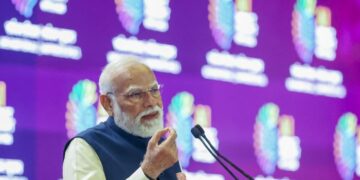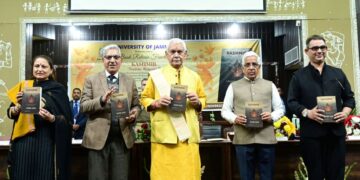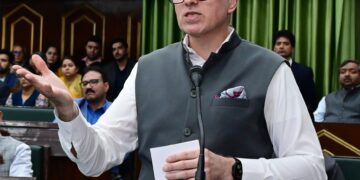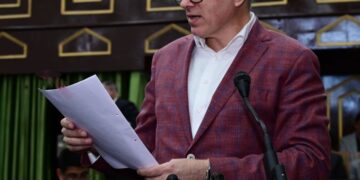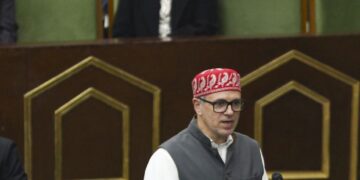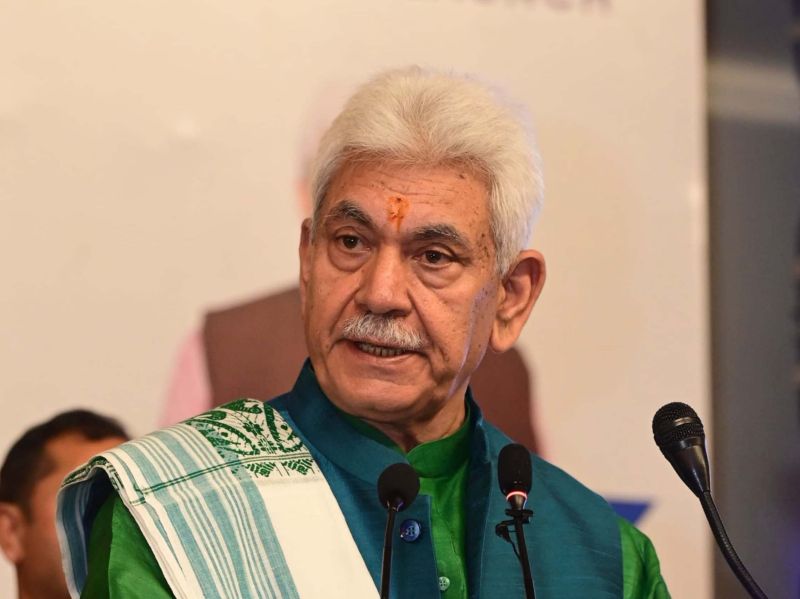R S Pura (Jammu): West Pakistan refugees, and the members of the Valmiki community exercised their franchise for the first time in the Jammu and Kashmir Assembly elections on Tuesday and termed it as a “historic moment”.
Ruldu Ram’s joy knew no bounds after he voted for the first time in his life at the age of 90, nearly eight decades after migrating from Pakistan during the Partition. He was among hundreds of West Pakistan refugees in the border town of R S Pura who cast their votes for the assembly elections in Jammu and Kashmir.
“I voted for the first time. I was not entitled to vote before. We came from West Pakistan in 1947,” he said.
This marks a “historic moment” for many who have long lacked political representation in the J&K assembly for the past 75 years.
Around 1.5 to 2 lakh people residing in various areas of Jammu, Samba and Kathua districts, particularly in the border regions, members of three communities — West Pakistan refugees (WPR), Valmikis, and Gurkhas — finally have domicile status following the abrogation of articles 370 and 35-A.
This made them natives of J&K, and therefore gave them rights to vote in the assembly elections, employment, education and land ownership. Previously they could only vote in the Lok Sabha polls. In July of this year, the J&K administration decided to grant proprietary rights to WPR families for the state land allocated to them during their resettlement after the 1947 migration.
“For us, it is a national festival today. It is a red-letter day in the history of these three communities, particularly West Pakistan refugees. We became part of true democracy in Jammu and Kashmir as we exercise our right to vote for the first time in our lifetime today,” President of the West Pakistan Refugees Action Committee Labha Ram Gandhi was quoted as saying by PTI.
Gandhi, who led the celebrations of the community in the border town, also known as the home of Basmati rice growers, said this was a dream come true for the community which had so far lived as “unwanted citizens”.
This paves the way to elect an MLA from the community in the future, said the 63-year-old refugee leader whose name is on the electoral roll at the Nundpur polling station in Samba.
“Credit goes to the prime minister and home minister for revoking Article 370, which enabled us to become voters of Jammu and Kashmir. We are grateful to them,” he added.
According to records, 5,764 families of WPRs settled in various parts of Jammu after escaping West Pakistan during the Partition in 1947. The number of WPRs has increased to over 22,000 families or 1.5-2 lakh individuals.
The Valmikis were originally brought to J&K in 1957 from Punjab’s Gurdaspur district for sanitation work by the state government.
“I am a first-time voter at the age of 45. We are thrilled and filled with enthusiasm to participate in J&K’s assembly elections for the first time. It is like a big festival for us,” Gharu Bhati, who voted at a polling station in Jammu, said.
Bhati, who has led efforts for over 15 years to secure citizenship rights for his community said, “This is a festival for the entire Valmiki community. We have voters as old as 80 and as young as 18. Two generations before us were denied this right, but justice prevailed when Article 370 was abrogated, granting us citizenship of J&K.”
“For decades, our community, brought here for sanitation work, was denied basic rights, including the right to vote and citizenship of J&K. It is a historic moment for the entire Valmiki community,” he said.
Approximately 12,000 members of the community residing in Gandhi Nagar and Dogra Hall areas were previously deprived voting rights, education, job opportunities, and land ownership due to absence of a state subject certificate.
“Two generations of our people have lived without these rights, but justice prevailed with the abrogation of Article 370. We were once a dark spot on Jammu and Kashmir’s justice and constitutional framework. Today, as part of the largest democracy in the world, Valmiki Samaaj, West Pakistan refugees, and Gurkha communities have finally gained their constitutional rights after 75 years,” Bhati said.
With the revocation of Article 370, both West Pakistan refugees and Valmikis can now buy land, apply for jobs, and participate in elections in J&K. The Valmiki community can explore alternative livelihoods as well.
“Today, we are voting. Tomorrow, we will represent our people. This marks the beginning of a new era in our lives. We will bring our issues to the assembly. Imagine, a member of our community, who once only saw scavenging as their fate, can now aspire to be an MLA or even a minister. That’s the magnitude of change we’re witnessing,” Bhati said.
Standing in a long queue, 19-year-old Komal shared the same sentiment, saying, “I am fortunate to vote. My 74-year-old grandmother is also voting today. I’m happy that the era of injustice and discrimination has ended.”
Another community member, 22-year old Aikta Mathoo along with his 53-year-old father, a sanitation worker, cast his vote at the Gandhi Nagar polling station.
“We both are voting for the first time. My father failed to vote in past elections. He could not get a better job here. Now I aspire to become a judge. The credit goes to the central government, who abrogated Article 370 and made us citizens in J&K,” he said.
The primary demand of the Valmiki community is improvement in their living conditions.
With their newfound voting rights, they are optimistic about advocating for better housing, education, and employment opportunities for the community. (With inputs from PTI)


